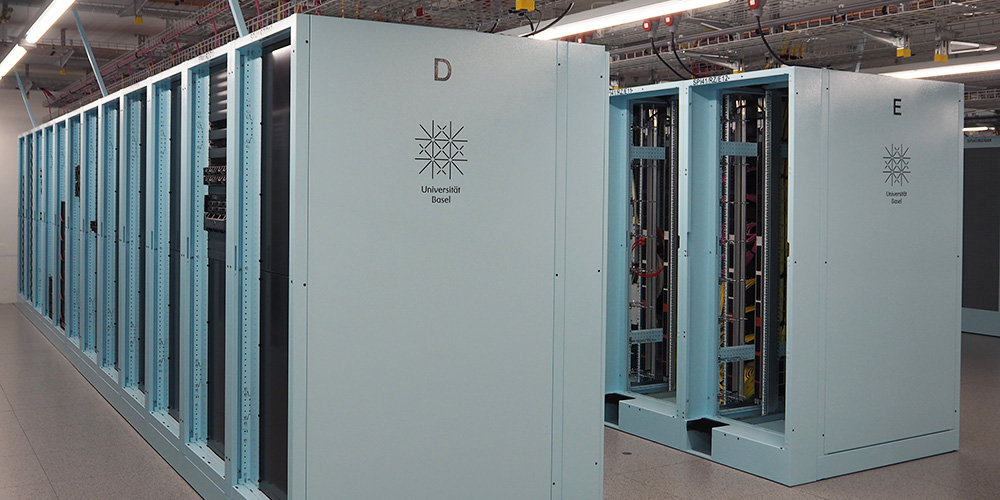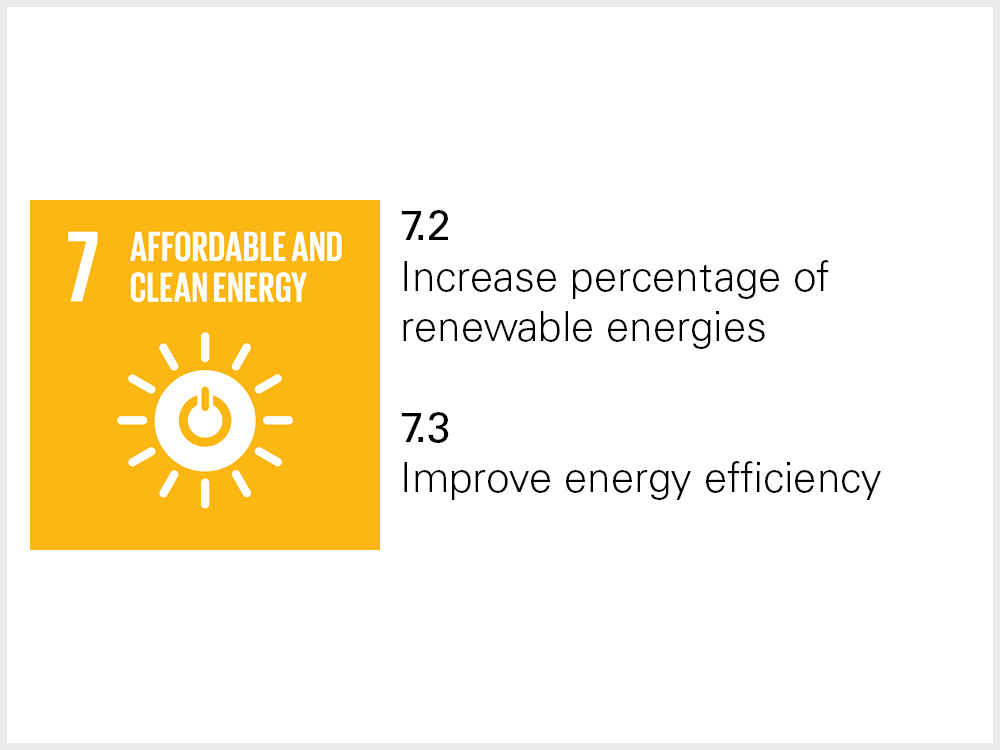Energy

Following a temporary increase due to the concurrent use of the old and new Biozentrum buildings during its move in 2021, energy consumption at the University of Basel sank to 61.5 GWh in 2022, which represents about 4% decrease from 2019. Since 2021, photovoltaic panels on the roof of the Center for Pharmaceutical Sciences have provided power for internal use. The addition of the Petersplatz central cooling system also led to reduced energy consumption for cooling.
The University of Basel is constantly working to improve the climate friendliness, resource conservation and efficiency of its energy supply. Energy procurement has been based primarily on renewable sources since 2020.1 Additional measures for reducing energy consumption are constantly being identified and implemented.
Energy consumption
The University of Basel uses energy primarily in the form of electricity (approx. 58% of total energy consumption in 2022), district heating (approx. 28%) and district cooling (approx. 3%). In 2021, total energy consumption rose to 68.8 GWh, which was due to the simultaneous use of the old and the new Biozentrum buildings during its move. In 2022, this decreased again to 61.5 GWh, which represents a reduction of 3.9% from 2019 levels. The increase in annual values compared to 2016–2018 is primarily due to expanded data collection from 2019 onwards.2
Internal electricity production
In summer 2021, the university installed its first photovoltaic panels system on the roof of the Center for Pharmaceutical Sciences. It produced approx. 34,000 kWh of electricity for internal use in 2022. The photovoltaic system planned for the roof of the new building of the Department of Sport, Exercise and Health in Münchenstein is expected to increase annual internal electricity production to over 200,000 kWh. Further installations are currently under consideration.
Energy-efficient server room
In the new Biozentrum, a state-of-the-art server room is already housing 70% of the University of Basel’s servers. The servers are cooled via a closed hydraulic circuit, which considerably lowers energy consumption.
Identification of potential areas for energy savings
In 2021 and 2022, a number of analyses were carried out to identify potential measures that could lead to significant energy savings. Changes in the areas of lighting and lighting control, in particular, can be easily implemented without affecting teaching and research in any way. New possibilities for simple and temporary measurement of energy use, together with the newly organized university-wide energy monitoring system, provide a foundation of detailed numbers for comparison: only what is measured can be improved in a lasting way.
An important step in reducing energy consumption from cooling was the commissioning of the Petersplatz central cooling system in 2021. The system, which replaced inefficient refrigeration machines, provides cooling for the tropical house, the Bernoullianum and the student cafeteria. Other buildings, including the Kollegienhaus (main building), will be connected to the new system when their current refrigeration systems are no longer operable.
The Energy Task Force as an answer to the energy crisis
Due to the energy crisis, the Energy Task Force, which consists of administrative and research staff, was formed in the fall of 2022. The goal of the task force was to work together with the faculties and departments to identify potential areas for energy savings. Research in the natural and life sciences requires many installations and apparatuses with comparatively high energy usage – for the cooling of experiments, for example. Nonetheless, a very constructive dialogue was established with the researchers last winter in order to tap the potentially significant savings in this area. One consensus that emerged from these talks is that awareness and behavior of the university members are critical elements of the process.
Goals & actions
Reduce energy consumption at the University of Basel
For certain, energy-intensive buildings, University of Basel aims to achieve energy savings of 15% for electricity and 5–10% for water use. Measures will be agreed with the participants in each case based on the ownership structure and associated detailed agreements.
Gradually centralize server rooms at the University of Basel to benefit from energy use advantages
Project Management & Engineering
Campus Services
IT Services
Increase the share of renewable energies and use of waste heat to cover the university’s energy requirements
Install two new photovoltaic panel systems
Project Management & Engineering
Improve data collection and monitoring of energy and water consumption
Automate data evaluation in the energy management and monitoring system (EMMS), develop a concept for reporting results to user groups in the various buildings
Project Management & Engineering
Reduce energy consumption at the University of Basel
Open central cooling system in the second quarter of 2021. Replace inefficient cooling systems
Project Management & Engineering
Campus Services
[1] Since 2020, all of the university’s purchased energy has been from renewable sources. Approximately 95% of heating is provided by district heating, with only 5% from natural gas and heating oil.
[2] Since 2019, the university has been able to include the energy consumption for additional buildings through utility billing calculations.


